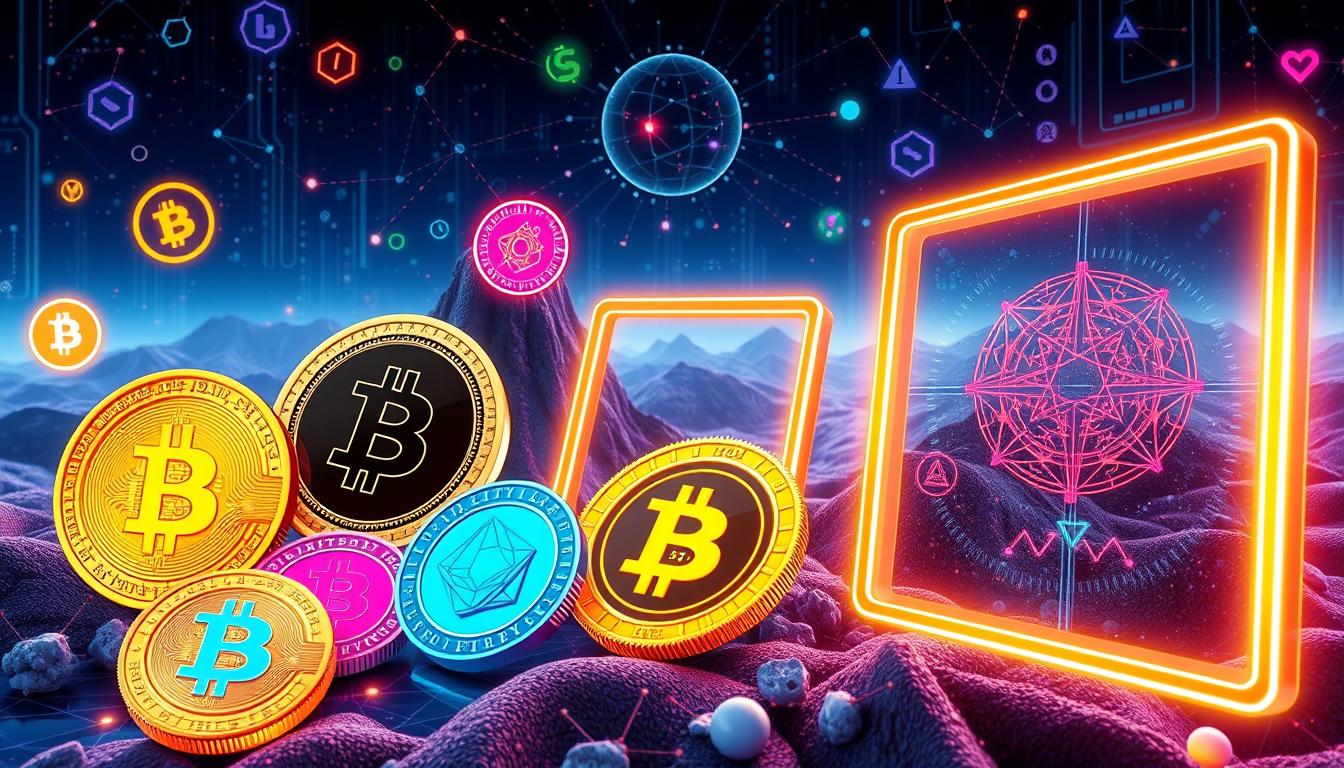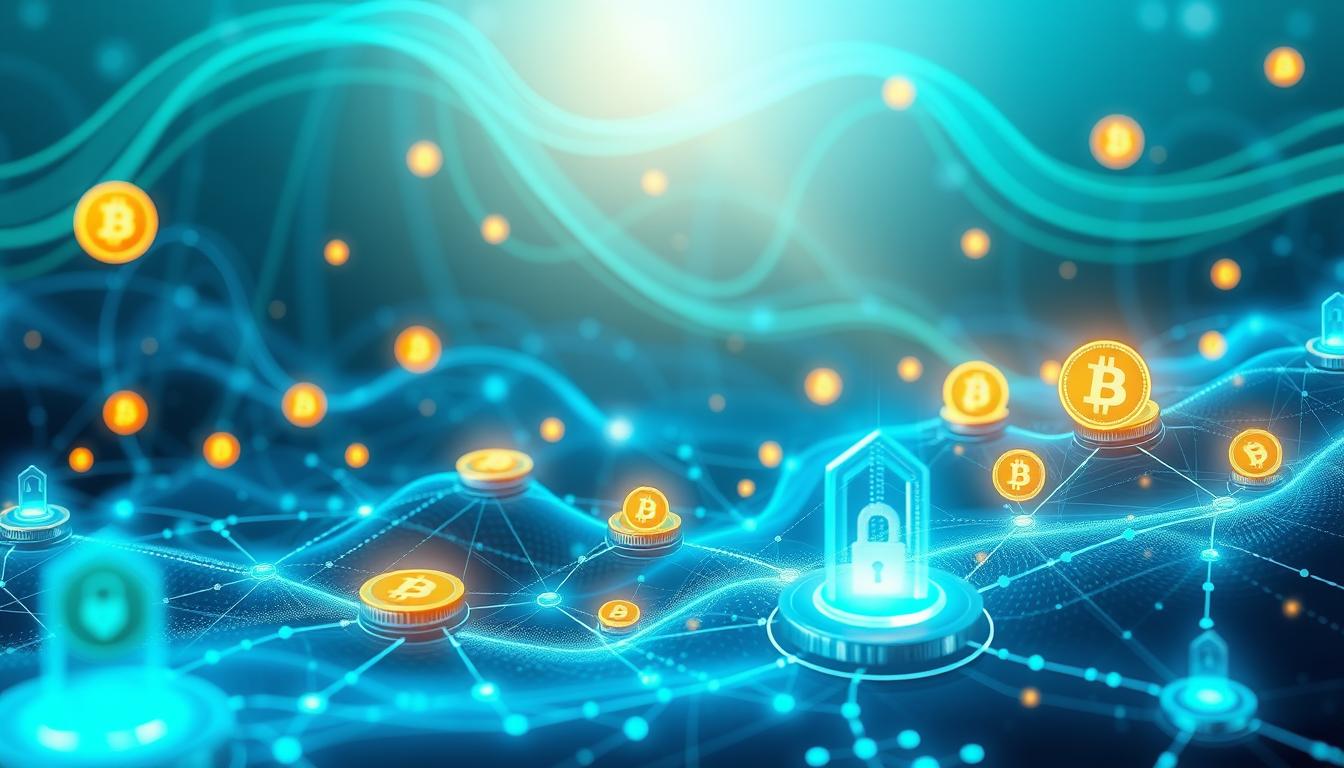Ever thought about a tweet selling for millions or virtual real estate as an investment? Welcome to the digital asset world. Here, anything created and stored digitally has value. It can be traded in today’s tech world.
Things like cryptocurrencies, NFTs, digital art, and virtual real estate are key. Knowing about digital assets is vital in our digital lives. Blockchain tech is changing how we own things, affecting our personal and work lives.
Learn more about digital assets and how they change our digital economy. Check out Investopedia’s digital asset framework for insights.
Key Takeaways
- A digital asset holds value and is discoverable, including forms like cryptocurrencies and NFTs.
- Blockchain technology enables the tokenization of real-world assets, enhancing security and liquidity.
- Digital ownership is significant for both individuals and organizations in the evolving digital landscape.
- Cryptocurrencies such as Bitcoin and Ethereum are leading examples of decentralized digital currencies.
- Non-fungible tokens (NFTs) provide unique ownership in art, gaming, and other digital domains.
- Government-regulated Central Bank Digital Currencies (CBDCs) represent national fiat in a digital format.
Understanding Digital Assets
Digital assets are items that exist only in digital form. They can be created, stored, and traded based on ownership. You might wonder, what is a digital asset? These include personal data, multimedia files, and even financial items like cryptocurrencies. The link between digital assets and blockchain tech is key to understanding their nature and uses.
Definition of Digital Assets
Digital assets show ownership in digital ways, making transactions direct. For example, cryptocurrencies live on a blockchain and use cryptography to keep data safe. This shows a big change towards DeFi, making digital ownership more important in our digital world.
The Importance of Digital Ownership
Digital ownership is key in today’s finance world. It gives users proof of ownership and safe transactions. Digital assets help move value without needing banks, showing a shift towards a more open financial system.
| Aspect | Description |
|---|---|
| Definition | Digital assets include items in digital form that establish ownership, like cryptocurrencies and NFTs. |
| Ownership | Digital ownership provides security and verifiable transaction history, crucial for trust and accountability. |
| Blockchain Role | Blockchain technology facilitates the creation, storage, and trade of digital assets, ensuring transparency and security. |
| Examples | Common examples include cryptocurrencies, non-fungible tokens (NFTs), and tokenized assets. |
| Economic Impact | A growing trend towards digital assets fosters greater access to finance and encourages decentralized markets. |
What is a digital asset?
A digital asset is something that exists only in the digital world. It has unique qualities that make it valuable. These include being identifiable, transferable, and able to generate income for its owner. This section will dive into what makes digital assets special and give examples.
Characteristics of a Digital Asset
Digital assets stand out in the market because of their special traits. Key features include:
- Identifiable: Each digital asset has unique identifiers, ensuring clear ownership.
- Transferable: Digital assets can be easily transferred between users, facilitating trade and exchange.
- Value Generation: Owners can benefit from digital assets through appreciation in value or income generation.
- Storage on Blockchain: Many digital assets exist on blockchain technology, providing secure and transparent records of ownership.
Examples of Digital Assets
Digital assets come in many forms and are growing as technology advances. Here are some examples:
- Cryptocurrency: Bitcoin and Ethereum represent virtual currencies utilized for transactions and investments.
- Non-Fungible Tokens (NFTs): Unique digital tokens that denote ownership of specific items, such as art and music.
- Convertible Virtual Currencies: Stablecoins that maintain their value against traditional currencies.
- Digital Content: Files like images, videos, and documents that can be owned and traded.
Digital assets are becoming more common in different areas. They show versatility and impact on the economy. Understanding them is key for financial success.
Types of Digital Assets
Digital assets come in many forms, each with its own role in the online world. You’ll find things like cryptocurrency, non-fungible tokens (NFTs), tokenized assets, and Central Bank Digital Currencies (CBDCs). Each has its own special features and uses, making them valuable in digital finance.
Cryptocurrency
Cryptocurrency is a digital money that doesn’t need banks. It uses blockchain for safe, direct transactions. You might know Bitcoin, Ethereum, and Litecoin. It’s popular for being private and secure, but it can be unpredictable.
Non-Fungible Tokens (NFTs)
NFTs are unique digital items that prove you own something special, like art or collectibles. They can’t be swapped for something else, making each one unique. They also let creators earn money when their work is sold again, which is great for artists.
Tokenized Assets
Tokenized assets are real-world items turned into digital tokens. They make it easier to own a piece of something big with just a little money. This makes investing more accessible and builds trust among investors.
Central Bank Digital Currencies (CBDCs)
CBDCs are digital money backed by governments. The Digital Yuan is a good example. It’s designed to make payments faster and cheaper. CBDCs are seen as a way to improve digital finance by being quick and reliable.

Benefits of Digital Assets
Digital assets bring many advantages that change how we deal with money and investments. They offer more than just owning something. They show how technology can improve managing assets and financial practices.
Decentralized Finance and Accessibility
Decentralized finance (DeFi) is key to digital assets’ benefits. It cuts out middlemen, making it easy for people to trade directly with each other. This opens up financial services to more people, especially those who were left out before.
DeFi makes things faster, cheaper, and more efficient. It brings financial chances to everyone, not just a few.
Enhanced Security and Transparency
Blockchain technology is at the heart of digital assets’ security and openness. It creates a permanent record of all transactions. This means fraud is much less likely.
Thanks to blockchain, people can trust digital assets more. They see how transparent and secure their transactions are.
Portfolio Diversification Opportunities
Digital assets offer a chance to diversify your portfolio. You can explore different digital assets like cryptocurrencies or NFTs. This way, you can reach markets that traditional investments can’t touch.
This diversification can reduce risks and possibly increase your returns. It’s a smart move for investors looking to grow their wealth.

| Benefit | Description |
|---|---|
| Decentralized Finance | Elimination of intermediaries enhances access and reduces transaction costs. |
| Security and Transparency | Blockchain technology ensures secure transactions and an immutable record. |
| Portfolio Diversification | Allows investments in a mix of asset types, mitigating risks. |
Conclusion
The importance of digital assets is huge in today’s world. Over 500 million people own cryptocurrencies, and the market value is over $3.2 trillion. This shows how digital assets are changing how we own and exchange value.
As more industries use blockchain, we need to know about the different types of digital assets. Each has its own special features.
Looking ahead, the future of digital assets is full of both chances and challenges. In finance, real estate, and marketing, digital assets are making a big impact. For example, the tokenized real estate market is worth $3.5 billion. And, billions of dollars are spent on NFTs in places like OpenSea.
Getting involved with digital assets can help people and businesses grow. It’s important to stay up-to-date and flexible in this fast-changing field.
In the end, the conclusion on digital assets is clear. We need better laws and experts to deal with the complex world of digital assets. For more on legal issues and managing digital assets, check out this report here. Using digital assets wisely can help businesses grow and work better in our digital world.
